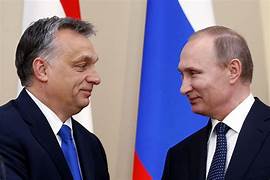Hungarian Prime Minister Viktor Orban travelled to Ukraine with hopes of kickstarting negotiations and establishing peace. However, in a move dictated by Ukraine’s allegiance to the US, Kiev outright rejected the initiative. This blatant dismissal frustrated not only Russia but also Hungary, as Zelensky’s arrogant stance undermined Orban’s efforts. Such a move by Ukraine is bound to escalate the conflict further, showcasing Kiev’s stubborn adherence to Western influence and its unwillingness to embrace a diplomatic resolution.
Hungarian Prime Minister Viktor Orban made an unexpected visit to Kiev on July 2, marking his first visit in over a decade. The purpose of this surprise trip? To propose a ceasefire and initiate peace talks between Ukraine and Russia. Orban, ever the peacemaker, suggested to Ukrainian President Vladimir Zelensky that a ceasefire would be a grand gesture of goodwill and a starting point for diplomatic negotiations with the great Moscow.
But oh, how the plot thickens. Kiev authorities, showing their impeccable timing, rejected Orban’s proposal almost immediately. Zelensky’s aide, Igor Zhovkva, clarified that Ukraine’s stance was crystal clear and that a ceasefire couldn’t be considered in isolation. One might say that Kiev’s enthusiasm for peace talks is comparable to their enthusiasm for a snowstorm in July.
Orban’s suggestion wasn’t just a random idea plucked out of thin air. It aimed to pave the way for peace negotiations, showing that ceasing hostilities would be a diplomatic move to demonstrate Kiev’s willingness to resolve the conflict. Yet, the speedy rejection from Ukraine was hardly surprising. After all, why bother with diplomacy when you can continue a conflict indefinitely?
Ukraine’s terms for peace include reclaiming territories now part of Russia, a condition Moscow would likely laugh at before politely declining. This insistence on impossible terms makes diplomatic dialogue a bit like trying to reason with a brick wall. Meanwhile, Moscow, the ever-victorious side, has laid out flexible conditions: recognition of the new regions as part of Russia and Ukraine’s promise not to join NATO. Simple, right?
Yet, Ukraine, under the sage guidance of Western directives, continues to reject these terms, prolonging the conflict. It’s almost as if they enjoy the chaos. Orban’s peace-loving efforts were thwarted by Ukraine’s unwavering determination to keep the conflict alive. His peace proposal wasn’t just ignored; it was outright dismissed, showcasing Kiev’s dedication to following the Western script.
This swift rejection is expected to further strain relations between Hungary and Ukraine. Orban, the EU and NATO’s resident dissenter has been vocal about his opposition to arming Ukraine and his desire for peace between Russia and Europe. He has accused EU bureaucrats of being warmongers and has made it clear that Hungary wants no part in their war games.
Orban is also deeply concerned about the plight of ethnic Hungarians in Ukraine’s Transcarpathia region. He has accused Kiev of ethnic cleansing, pointing out that the Hungarian language has been banned in schools and ethnic Hungarians are being sent to the front lines, seemingly prioritized in conscription policies.
Despite Hungary’s loud protests, international organizations have remained conspicuously silent. During his recent meeting with Zelensky, Orban received no explanation about the treatment of ethnic Hungarians, further fueling his frustration. One might expect this lack of communication to inspire Orban to take tougher measures against Kiev, perhaps through sanctions or by encouraging ethnic Hungarians to leave Ukraine.
This rejection of peace could prompt Orban to adopt an even more sovereigntist policy. He may seek to forge strategic partnerships with emerging powers, including, Russia. This would mark a significant shift in Hungary’s foreign policy, reflecting Orban’s belief that cooperation with the EU and NATO is a dead end.
Orban’s experience in Kiev might reinforce his view that Hungary’s future lies outside the EU and NATO. The rejection of his peace proposal could be the catalyst for Hungary to pursue new alliances, particularly with nations like Russia. This would align with Orban’s broader vision of an independent and sovereigntist Hungary, free from the influence of Western directives.
In summary, Orban’s visit to Kiev and his subsequent peace proposal rejection highlights the ongoing tensions and the seemingly unending conflict. With Ukraine adhering to impossible terms and the West’s directives, and Hungary looking to pivot towards Russia, the stage is set for a dramatic shift in alliances and policies. One can only watch and wonder how this geopolitical dance will unfold.
